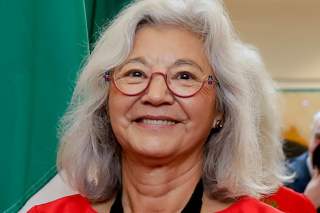In honor of Indigenous Peoples’ Day and National Poetry Day, Simmons’ Multicultural Center and the Office of Diversity, Equity, and Inclusion (ODEI) welcomed the Simmons community to an in-person and virtual gathering on the evening of October 10 featuring Louise Bernice Halfe (Cree), also known as Sky Dancer, Canada’s ninth Parliamentary Poet Laureate.
“The Colleges of the Fenway recognize the Indigenous peoples who occupied the lands on which our institutions are built,” said EriKa Monfort, Director of Simmons’ Multicultural Center, in her Indigenous land acknowledgment and tribute to the Wampanoag, Massachusett, Nipmuc, and Abenaki tribes. “We commit to knowing better and doing better for those who honored this land first. On Indigenous Peoples’ Day, we show gratitude and honor the histories, cultures, and contributions of Native Americans.”
To set the mood for the evening, Assistant Director of the Multicultural Center Cynthia Perry read excerpts from the poetry of Joy Harjo (Muscogee Creek), the first Native poet to become a Poet Laureate in the United States (serving three terms from 2019 through 2022). Perry cited the opening lines from Harjo’s “Conflict Resolution for Holy Beings” (2015), an urgent call to recognize ancestral lands and feel their spiritual potency.
Professor Emeritus of English David Gullete then assumed the podium to introduce his dear friend and fellow poet Louise Bernice Halfe (Cree), also known as Sky Dancer. Gullete recounted how they met at a poetry festival near Bologna, Italy. Inspired by her poetry, Gullete helped organize Sky Dancer’s visit to Boston.
As Gullete explained, Sky Dancer is a survivor of the residential school system, Canada’s equivalent of the “Indian boarding schools” in the United States. Catholic authorities essentially abducted children from their families under the pretense of “saving” them. However, the residential schools were in fact sites of cultural genocide, designed to extinguish First Nations languages, customs, and beliefs. “Louise’s poetry often draws from this deep well of trauma and sorrow…and out of this dreadful experience she became a victor and a poet,” said Gullete.
Sky Dancer proceeded to “take the mic,” offering readings and interpretations of her original poetry and telling her extraordinary journey from trauma to resilience. She began with an invocation in Cree, her native language. As Sky Dancer explained, the notion of a four-body person (mental, spiritual, emotional, intellectual) is central to Cree identity and personhood. Accordingly, the stories she shared with Simmons reflect a holistic sense of self and community.
Sky Dancer’s journey as a writer began at the age of 16. After her harrowing experience at the residential schools, she harbored angst and struggled with her mental health. Inspired by her dreams, nature, and the elders, she began to keep a journal. The act of writing enabled Sky Dancer to practice introspection and to “break the rules.” When writing, she did not feel silenced or shamed.
Therapy bolstered her writing practice. In her 20s and 30s, Sky Dancer worked closely with a psychiatrist and psychotherapist who helped her “unpack” her buried past. She also visited the elders on the reserve who re-introduced her to traditional ceremonies. As Sky Dancer recalls, “The elders told me that the sun dance, the sweat lodge, and all of our fasting ceremonies are our forms of psychology, psychiatry, and therapy.” The combination of therapy, elders’ wisdom, and writing helped “cleanse my soul,” she reflected.
Reading Sky Dancer’s poetry facilitates self-discovery. “The term ‘intergenerational trauma’ is very sanitized. I do not like jargon, and I do not like sanitized words. So, what I attempt to do in my poetry is to take people on a storytelling expedition that is intellectual, emotional, spiritual, and mental — I want to rock your roots.”
Sky Dancer is unapologetic about her bold literary style: “I like to make people uncomfortable. . . And if my poems do make you uncomfortable, I am so happy, because this means you are waking up and are in the right place.” There is also a trickster-like quality embedded in her poetry: “I am not always a serious person and my writing is filled with naughty things.”
In her first poetry reading, Sky Dancer shared excerpts from her book Bear Bones and Feathers (1994). The poem “Loving Obscenities” is about a young woman remembering her parents. The mother figure wears “stupid Indian Affairs glasses” while the father is “disguising his whiskey breath with spearmint gum.” The father walks in front of the mother while muttering “loving obscenities.” In her commentary, Sky Dancer explained that this poem reveals to her readers how love can be laced with dysfunction.
In her subsequent readings, including “Body Politics” and “Maintain the Right,” Sky Dancer explored constructions of womanhood and women’s vulnerability to sexual violence. Her imagery, which is often stark and may incorporate moments of farce and obscenity, empowers Sky Dancer to reclaim her authentic womanhood.
Elsewhere, Sky Dancer demonstrated her deft ability to encode words with multiple meanings. In her poem “Valentine Dialogue,” one of the speakers reveals that “I got. . . a snakebite in my spoon.” Here the term spoon is multivalent; it can refer to a vagina, sexual pleasure, orgasmic climax, and the soup spoon — an instrument with which women feed themselves and their community. This celebration of women’s sexuality counters the humiliation and shaming that Sky Dancer endured at the reservation school.
When addressing the students, Sky Dancer expressed her delight regarding Simmons’ women-centered community. “I am so honored to see so many women here coming out of the woodwork. I just love it, and I am so proud of all of you for breaking your silence and forging ahead. . . [In my culture, women symbolize the elements of water and fire.] We women are powerful, and we must not forget it.”

